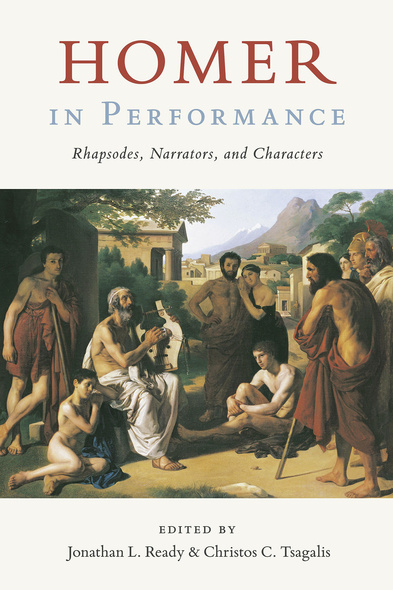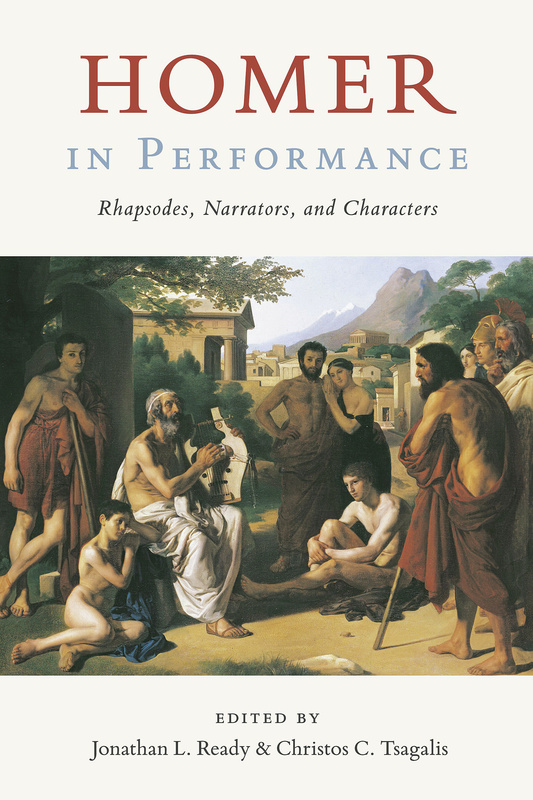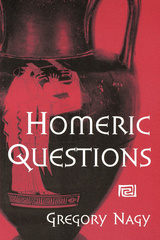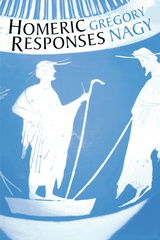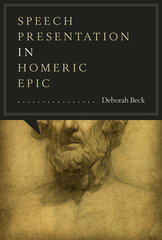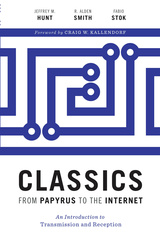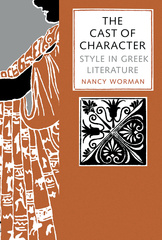Homer in Performance
Rhapsodes, Narrators, and Characters
Before they were written down, the poems attributed to Homer were performed orally, usually by rhapsodes (singers/reciters) who might have traveled from city to city or enjoyed a position in a wealthy household. Even after the Iliad and the Odyssey were committed to writing, rhapsodes performed the poems at festivals, often competing against each other. As they recited the epics, the rhapsodes spoke as both the narrator and the characters. These different acts—performing the poem and narrating and speaking in character within it—are seldom studied in tandem. Homer in Performance breaks new ground by bringing together all of the speakers involved in the performance of Homeric poetry: rhapsodes, narrators, and characters.
The first part of the book presents a detailed history of the rhapsodic performance of Homeric epic from the Archaic to the Roman Imperial periods and explores how performers might have shaped the poems. The second part investigates the Homeric narrators and characters as speakers and illuminates their interactions. The contributors include scholars versed in epigraphy, the history of art, linguistics, and performance studies, as well as those capable of working with sources from the ancient Near East and from modern Russia. This interdisciplinary approach makes the volume useful to a spectrum of readers, from undergraduates to veteran professors, in disciplines ranging from classical studies to folklore.
A thought-provoking panoply of approaches to Homeric performance...The essays are for the most part of high quality, and the book is beautifully edited and produced, with a very useful bibliography...this is a fine volume of essays providing a variety of ways in to the interaction of performance and text in the Homeric poems.
This collective volume seeks new angles from which to appreciate the artistry of Homeric epic by bearing down on its mode of performance, that blend of authoritative narrative and dramatic enactment called rhapsody...This volume shows that it can be profitable to consider epic rhapsody both as a popular mode of institutionalized storytelling and as a medium with unique resources for poetic expressivity.
Although the contributors are wide-ranging in their approaches to the Homeric epics, Homer in Performance is not a disparate collection of loosely connected essays; rather it is a carefully conceived collaborative effort that aims to provide a comprehensive picture of all that we know about the composers and performers of the Homeric epics. This book will be an essential point of departure for anyone wishing to understand the composition and performance of the Homeric epics in antiquity or the poetics of speech and performance as they are depicted within them.
The editors have brought together a distinguished collection of essays that considers how the Homeric poems were experienced by the audiences of antiquity and examines the performance and narrative strategies of the poet and his characters (who may mature and develop within the poem). The extraordinary range and quality of the scholarship make this volume a valuable contribution to Homeric studies.
Jonathan L. Ready is an associate professor of classical studies at Indiana University. His books include The Homeric Simile in Comparative Perspectives: Oral Traditions from Saudi Arabia to Indonesia.
Christos C. Tsagalis is a professor of Greek at Aristotle University. His books include Early Greek Epic Fragments: Antiquarian and Genealogical Epic.
- A Note on Iota Adscript and the Transliteration of Proper Nouns
- Acknowledgments
- Introduction (Jonathan L. Ready and Christos C. Tsagalis)
- Part I. Rhapsodes
- Chapter 1. Performance Contexts for Rhapsodic Recitals in the Archaic and Classical Periods (Christos C. Tsagalis)
- Chapter 2. Reading Rhapsodes on Athenian Vases (Sheramy D. Bundrick)
- Chapter 3. Performance Contexts for Rhapsodic Recitals in the Hellenistic Period (Christos C. Tsagalis)
- Chapter 4. Rhapsodes and Rhapsodic Contests in the Imperial Period (Anne Gangloff)
- Chapter 5. Formed on the Festival Stage: Plot and Characterization in the Iliad as a Competitive Collaborative Process (Mary R. Bachvarova)
- Chapter 6. Did Sappho and Homer Ever Meet? Comparative Perspectives on Homeric Singers (Olga Levaniouk)
- Part II. Narrators and Characters
- Chapter 7. Odysseus Polyonymous (Deborah Beck)
- Chapter 8. Embedded Focalization and Free Indirect Speech in Homer as Viewpoint Blending (Anna Bonifazi)
- Chapter 9. Speech Training and the Mastery of Context: Thoas the Aetolian and the Practice of Muthoi (Joel P. Christensen)
- Chapter 10. Diomedes as Audience and Speaker in the Iliad (James O’Maley)
- Chapter 11. Hektor, the Marginal Hero: Performance Theory and the Homeric Monologue (Lorenzo F. Garcia Jr.)
- Chapter 12. Performance, Oral Texts, and Entextualization in Homeric Epic (Jonathan L. Ready)
- Chapter 13. Homer’s Rivals? Internal Narrators in the Iliad (Adrian Kelly)
- Works Cited
- Contributors
- Index of Terms
- Index of Passages

